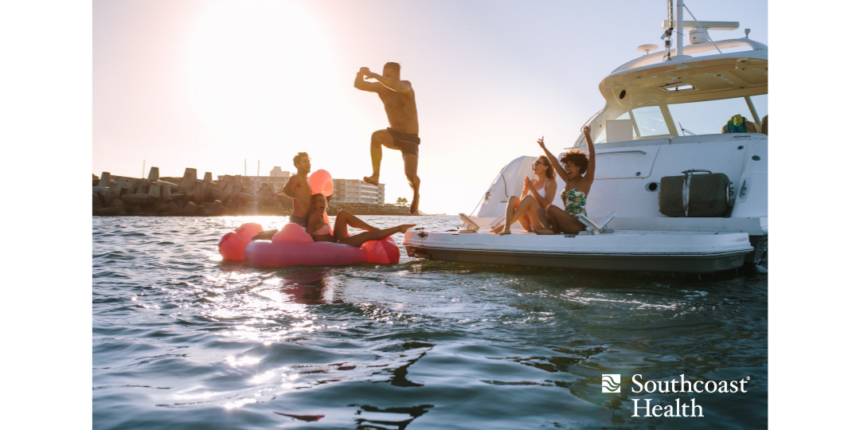Health Tips
Summer Wellness: Swimming and Boating Safety

Swimming, boating and water sports are among the things that make summer so special in southeastern Massachusetts and Rhode Island. Remember to use caution and be safe while you enjoy the ocean, bays, rivers and lakes. Drowning is the leading cause of fatalities during the summer months.
Follow these guidelines to protect from swimming and water sport accidents:
Boating safety
- Check weather and water conditions before leaving shore.
- Don’t drink and boat. Alcohol is a factor in many boating accidents. Choose a designated boat driver who will not drink.
- Insist that everyone wear a Coast Guard-approved personal flotation device or life jacket while on board.
- Always tell someone where you’ll be boating, when you expect to be back, and what your boat looks like.
- Keep Coast Guard-approved visual distress devices, such as pyrotechnic red flares, orange distress flags, or lights on board.
- Don’t carry more passengers than the maximum listed on the boat’s capacity plate.
Swimming safety
- If you have a pool, enclose it with a fence, wall, or other barrier at least 4 feet tall. Install self-latching gates that open outward.
- Don’t assume your child can swim. Many youngsters forget how to swim when panicked.
- Keep a portable phone in the pool area and program emergency contacts on its speed dial.
- Keep a close eye on children and non-swimmers who are using inflatable toys, inner tubes, and mattresses.
- Closely supervise children when they are diving or jumping in the pool to avoid head and back injuries.
- Keep the pool’s deck area clear of tripping hazards like toys, dishes, and hoses.
- Review safety measures and rules with guests before they swim.
Safety musts
- Never leave a young child alone near water. If you must answer the phone or get a towel, take the child with you.
- Keep an eye on your children and be aware of the locations of backyard pools in your neighborhood
- Enroll children in swimming lessons taught by qualified instructors.
- Don’t swim if you’ve been drinking alcohol.
- Don’t swim alone or allow others to do so.
- Stay out of the water during thunderstorms and other severe weather. During lightning storms, seek shelter away from metal objects, open areas, and large, lone trees.
- Don’t exceed your swimming ability. Know your limits and stick to them.
- Check the water level before diving into a pool, ocean, pond, reservoir, or lake.
- Always dive with your arms extended firmly over your head and your hands together.
- Don’t dive into unknown bodies of water, like lakes, rivers, quarries, or irrigation ditches. Jump feet first to avoid hitting your head on a shallow bottom, hidden rock, or other obstruction.
- Be alert to water conditions, including river currents and ocean rip currents, as well as water temperature.
- Be alert to underwater hazards, such as vegetation and animals.
Caution:
Swimming and water sports can lead to less serious concerns, such as swimmer’s ear, which is an infection in the outer ear canal. Swimmer’s ear is often caused by excess moisture in the ear canal.
Symptoms include itching and redness in the ear canal, mild discomfort and drainage of clear, odorless fluid. Symptoms can progress to more intense itching and redness, excessive fluid drainage, and partial blockage of the ear canal by swelling, fluid, and debris, muffled hearing.
What to do:
Contact your primary care provider or go to your nearest urgent care location.
For a helpful guide on how to get the right care for any injury or health problem, visit Know Where to Go.
If your condition is an emergency, please call 911 or go to the nearest emergency room.
